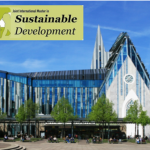Sustainable Development | University of Leipzig
The Joint International Master‘s Programme in Sustainable Development trains students to tackle the challenges of a transition towards a more sustainable society by focusing on interdisciplinary research and intervention strategies.
How does the programme provide content to ensure students achieve an understanding of a reasonably diverse set of perspectives on understanding economies?
The programme offers a truly interdisciplinary and international learning experience, combining the teaching and research excellence of eight partner universities in the field of economics and business administration, social sciences, political sciences, environmental sciences and engineering. In the field of economics, mandatory classes include environmental economics, development economics, but also sustainable financial management, corporate environmental management…. Students have further the possibilities to deepen their economics understanding with classes such as energy economics and biodiversity economics as well as natural resources management (water, land, energy…).
How does the programme ensure students understand the interaction between economic and ecological systems?
The programme trains students to analyse the complex interrelations between nature and society by applying interdisciplinary methodological and theoretical frameworks. During their mandatory mobility semester at one of the partners universities, students specialized on selected aspects of sustainable development following a natural and/or social sciences’ perspective according to their academic background and their personal objectives.
How does the programme ensure students understand how to critically explore real-world evidence, both qualitative and quantitative?
The programme exposes students to a large range of methods and theories from natural and social sciences to equip them with the interdisciplinary skills and knowledge required to tackle sustainability issues. For instance, in the 3rd semester, students work on an extensive interdisciplinary case study on a selected topic as preparation to their master thesis. This project requires to identify a real-world situation, apply a multidisciplinary scientific approach to analyse the complex interactions within a given systems and asses conflicts, identify solutions and make scientifically-founded recommendations to decision makers.
What pedagogical approaches does the programme use to ensure that students examine the historical context, assumptions and values in all economic thinking?
The curriculum covers relevant historical developments in the field of development economics, globalisation, ethics and sustainability theories among others. In addition, classes foster debates and discussions among students on past and present issues. Last but not least, group works, by bringing students from very diverse disciplines and countries together, are as many opportunities to confront their views and perspectives extensively, learn from each other, and strengthen their interdisciplinary and intercultural skills.
How does the department ensure that the teaching culture and capacity to deliver economic pluralism are continually improving?
The overall management and quality assurance of the programme is under the responsibility of the programme board that brings together representatives of all partner universities. It conducts yearly online evaluations among students over teaching contents and methods as well as among graduates regarding learning outcomes. during its yearly meeting, results are being reviewed and recommendations for further enhancement discussed. In addition, courses’ evaluations are being carried as part of the in-house quality management systems of each of the partner university according to their respective regulations.
Other information:
- Four semesters full time (two years, 120 ECTS) following an interdisciplinary approach • 60 ECTS minimum at the chosen entrance university: Leipzig University (Germany), University of Graz (Austria), Utrecht University (Netherlands) or Ca' Foscari University Venice (Italy);
- 30 ECTS specialization tracks in natural and/or social sciences during the mandatory mobility at one of the partner universities or the University of Basel (Switzerland) ;
- Additional mobilities possible at TERI University (India) and Stellenbosch University (South Africa);
- Joint Degree option with Hiroshima University (Japan)
Country:
Germany
University:
University of Leipzig
Course name:
Sustainable Development
Department/school:
Course level:
Taught Masters
Course language:
English

 all programmes
all programmes